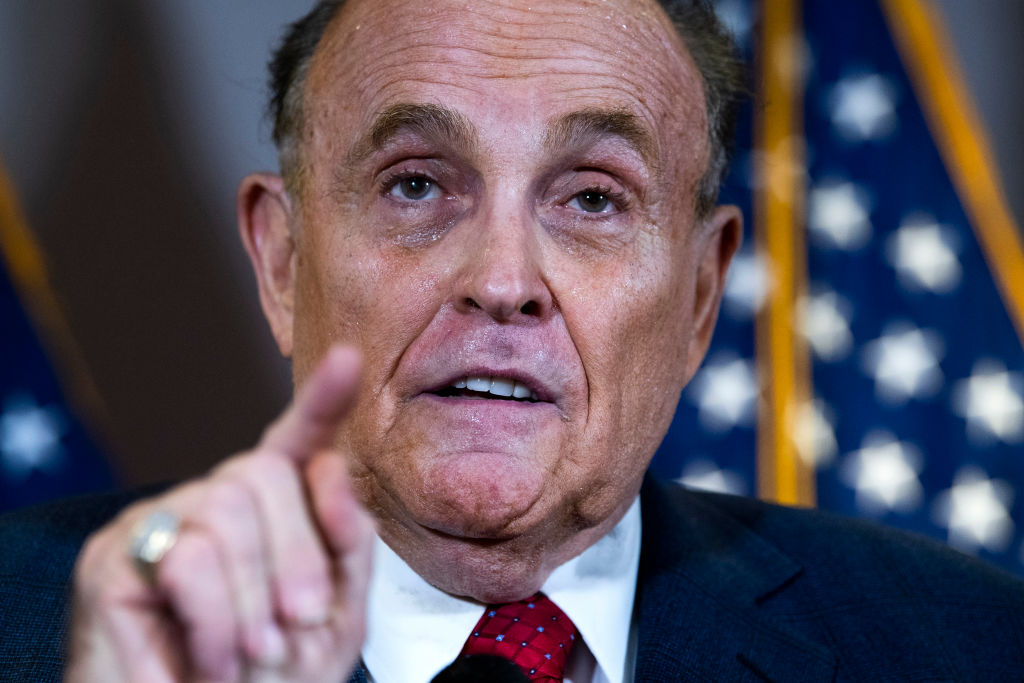
The Trump Administration imposed sanctions on Monday against a group of Ukrainians who helped President Donald Trump and his lawyer, Rudy Giuliani, collect and spread political dirt on President-elect Joe Biden.
The sanctions were announced by one of Trump’s most loyal cabinet secretaries, Steve Mnuchin of the Treasury Department, and repudiated conspiracy theories that Trump has used to attack his main rival. They also demonstrated Trump’s weakening grip on power in the wake of his incitement of the mob that attacked the U.S. Capitol on Jan. 6.
Trump’s theories about the corruption of the Biden family in Ukraine have been painstakingly investigated and widely debunked, including by the President’s Republican allies in Congress. The allegations still became a centerpiece of Trump’s re-election campaign, culminating in his attempt to air these theories on live television during the first presidential debate in September.
In its statement on Monday, the Treasury Department described some of the key sources for these allegations, including a former diplomat, a former prosecutor and a current lawmaker in Ukraine, as “part of a Russia-linked foreign influence network” that sought to undermine the presidential race. “Russian disinformation campaigns targeting American citizens are a threat to our democracy,” Secretary Mnuchin said in the statement.
Another member of Trump’s cabinet, Secretary of State Mike Pompeo, supported the move in a separate statement on Monday. The sanctioned Ukrainians, he said, had worked to advance “malicious narratives that U.S. Government officials have engaged in corrupt dealings in Ukraine.”
The announcement dealt a blow to the efforts undertaken on Trump’s behalf by Giuliani, who met with the sanctioned Ukrainians on multiple occasions, received documents from them and repeated their claims on cable news networks – all as part of his crusade to embarrass the Biden family and help his client win another term as President.
Of the people sanctioned on Monday, Giuliani was closest to Andrii Telizhenko, a former diplomat who worked for about a year as Giuliani’s fixer in Ukraine, starting in the fall of 2019. “My goal is just to help Mr. Giuliani connect to the right people in Kyiv, filter the evidence, what is true, what is not true,” Telizhenko told TIME of their relationship that year.
A highlight of their efforts was the trip Giuliani made in Dec. 2019 to Kyiv, where he met with a handful of former officials and lawmakers in Ukraine. Among them was Andrii Derkach, a member of Ukraine’s parliament whom the U.S. Treasury Department sanctioned last fall as an “active Russian agent.” In its statement on Monday, Treasury said its latest round of sanctions targeted people who worked “in support of Derkach’s efforts” to influence the 2020 elections, including Telizhenko, the current lawmaker Oleksandr Dubinsky, the former lawmaker Oleksandr Onyshchenko, and the former prosecutor Konstatin Kulyk.
Much of the information these sources provided to Giuliani was related to Biden’s son Hunter, who sat on the board of a Ukrainian gas company, Burisma, while his father served as Vice President. Giuliani has claimed that Biden acted corruptly in Ukraine to advance his son’s business interests.
These claims have never stood up to scrutiny. Two of Trump’s closest Republican allies in the U.S. Senate, Ron Johnson of Wisconsin and Chuck Grassley of Iowa, spent over a year investigating these allegations against the Bidens. Their final report, released in September, found no evidence of wrongdoing on the part of the former Vice President.
That did not stop Trump or his lawyer from continuing to spread these allegations during the election. In one of the ugliest exchanges of the first presidential debate, the President lashed out directly at Biden’s son. “He didn’t have a job until you became Vice President. And once you became Vice President, he made a fortune in Ukraine,” Trump said, trotting out the claims that his lawyer had tried to substantiate through his sources in Kyiv.
This campaign of misinformation continued into Election Day, when Giuliani again went on television to air the theories he heard from his Ukrainian associates. By that point, most mainstream news networks in the U.S. had stopped allowing him to voice these accusations on the air. So the President’s lawyer appeared on RT, the Kremlin-owned propaganda outlet. Even there, the interviewer pushed back on the claims so firmly that Giuliani grew exasperated. “The problem is there’s never enough evidence,” he said.
More Must-Reads from TIME
- Donald Trump Is TIME's 2024 Person of the Year
- Why We Chose Trump as Person of the Year
- Is Intermittent Fasting Good or Bad for You?
- The 100 Must-Read Books of 2024
- The 20 Best Christmas TV Episodes
- Column: If Optimism Feels Ridiculous Now, Try Hope
- The Future of Climate Action Is Trade Policy
- Merle Bombardieri Is Helping People Make the Baby Decision
Contact us at letters@time.com